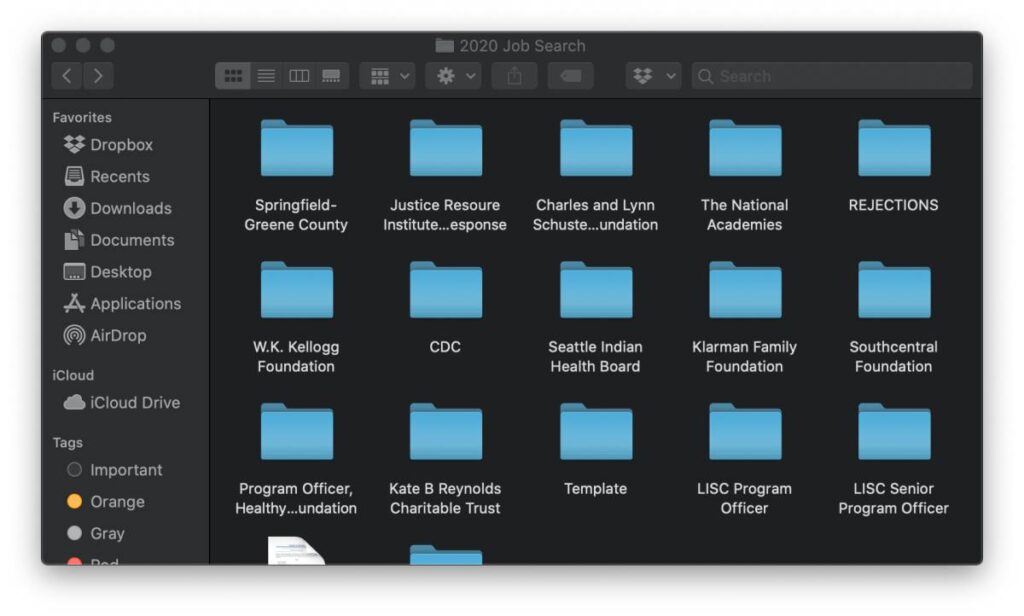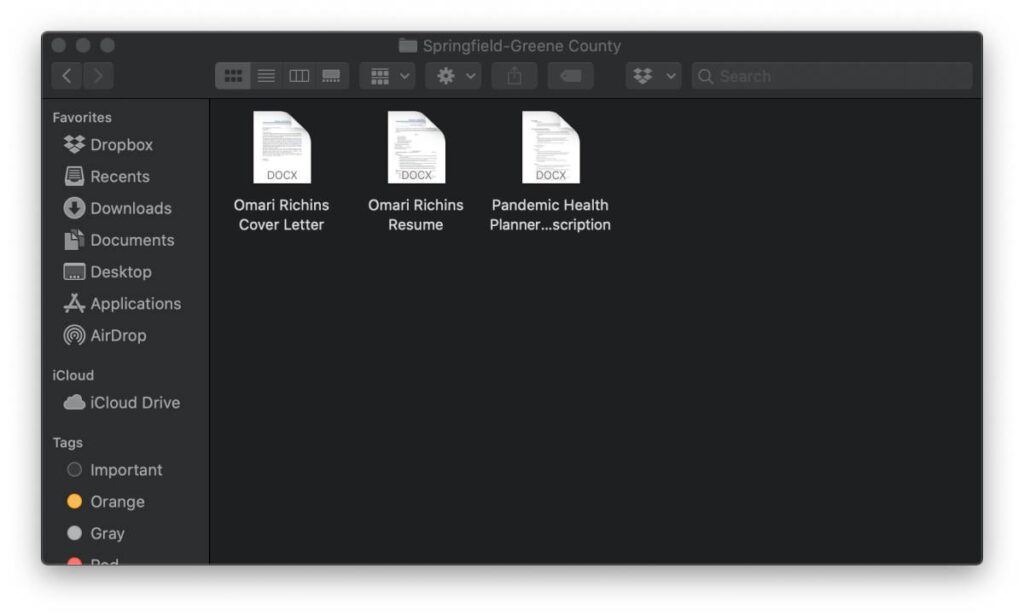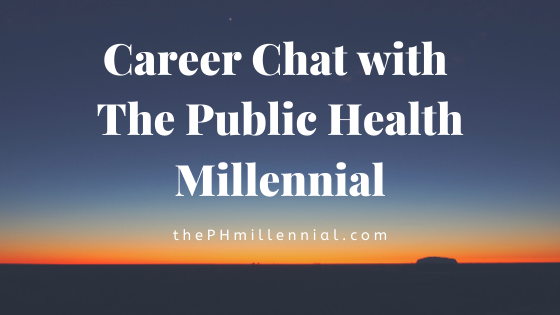A few weeks ago I did a couple zoom chats with a few of you to talk about what I was doing during COVID-19 to search for a career as my fellowship comes to an end.
I began the talk with introductions. Everyone shared a personal goal, a professional goal and a job they are interested in (broadly or specifically). Having a goal in mind can help you in your searching as you can be more focused. However, I think you could start broadly with a certain type of job role or interest and go from there.
Job searching especially now can be demotivating, so if you have someone you can use as your accountability buddy, this can help a lot. Perseverance is key applying to jobs right now. I myself, have had a hard time getting multiple interviews. Although I am currently interviewing with one organization – hopefully good news to come soon!
Support The Public Health Millennial on BuyMeACoffee
(Related: How To Search For Jobs During COVID-19)

What To Do Before You Start Applying For Jobs
Create a Spreadsheet
Spreadsheets are an essential tool to keep track of your job application process. Whether you create a spreadsheet through excel or on a google sheet – just create one.
Having one place to save multiple jobs descriptions and job information can ease a lot of stress and unnecessary open tabs. You can design the spreadsheet to your liking and to your job search.
I would include these columns with the categories:
- Link to Job
- Position Title & Company
- Degree Asks & Degree Preferred (if applicable)
- Main Experiences being asked for
- Position Summary
- City, State or Country Information
- Due Date
- Have You Applied? (Checkbox)
I think these categories are all important to capture the essence of the job application. And it will surely keep track when you are applying to more than 10 positions, as I’d recommend if you are looking for a job.
Additionally, you can add a row to rank jobs by criteria that are important to you. I’d say make this as objective as possible. I usually would rank jobs that I qualify for and are in areas I would like to work as highly. This helps me to decide which jobs to apply to first when I have so many.
The downside to doing this is that it takes time to enter in the information. But it definitely helps you a lot more once you have it entered.
(Related: Tips To Ace Your Interview)
Have a Job Folder
Having a job folder to save the resume, cover letter, job description, and salary requirements (if applicable) for each job is also important. You should be using a new cover letter for each job description. Also you should be tailoring your resume to different job descriptions, especially for the jobs you love.
If there is one thing you DON’T want to do – is not save a job description. After a job application process closes, the job description disappears. By saving the job description you can refer to it when you get called in for an interview. Either save the PDF job description or copy and paste it into a word document and save it. This will be invaluable to help you better know what to talk about in the interview.

You can create this folder with multiple hierarchy’s depending on your interest.
- Jobs > Positions
- Jobs > By State > Positions
- Or however makes sense to you in your circumstances
Use this job folder to capture all your application material you used to apply. It will be a great resource to help in the rest of the job searching process.

Where to Search For Jobs?
This list is going to be common to most, but there should be a couple that you may not have heard of that can be a helpful resource.
Top 4 Websites For Public Health Jobs
- Indeed
Currently in my opinion the best place to look for a public health job. - LinkedIn
The best platform to not only search for jobs but expand your public health network. - Google Jobs
Probably the most robust search engine for jobs. Ensure to have on job alerts as google will find many interesting jobs when you set the right criteria. - PublicHealthJobs.org
Offering jobs and volunteer opportunities in the public health workforce.
Other Noteworthy Places For Public Health Jobs
- Networking/Alumni
Networking early on and connecting with Alumni can help you to get a job in the public health field. - University Career Resources
Utilize your University Career Resources not only to find jobs, but to learn how to become a stronger applicant and polish up on professional development. - Public Health Employment Connection – Emory University
Emory University has a great resource that shares relevant public health jobs, fellowships and internships. - Glassdoor
Another great website to search for jobs. Also a great resource to get a better idea of market salaries for different jobs in different locations or throughout a organization. - Repro Jobs
Public health jobs focused around reproductive health, rights and justice movement organizations. - Idealist
Public health jobs and volunteering opportunities.
Government Jobs
- USAJobs.gov
For government jobs throughout the US and other territories. - CDC (Center For Disease Control & Prevention)
For CDC related jobs, internships and fellowships programs. - Governmentjobs.com
Another website to have government public health jobs.
Philanthropy Jobs
I’ll put this Philanthropy jobs list here since the impact that public health professionals can make in the field of Philanthropy (which cross sects Public Health in so many ways) can be monumental and I find not many public health people talk about this career path. Some of the below resources are also a great resource to look for grant funding.
- Philanthropy News Digest
- The Grantsmanship Center (By state)
- Inside Philanthropy
- The Chronicle of Philanthropy

Why Say Yes To A Job?
After you ace the interview and are offered the position, there a some things to ensure that are a fit for a job. Note: I understand we are in unprecedented times so I understand if these “luxurious” don’t count in a time of needing any job. But nonetheless, these things are important to gauge throughout the job searching process through to the interviewing process and before accepting an offer.
I break these into three categories: Personal, Company, and Monetary. These are not mutually exclusive and could overlap depending on your perspective.
Personal
Passion – does your passion align with the role you are working in? Is it something you can grind out until you get the next move while you learn skills or work for someone you admire? If you are able to work in a position where you are passionate and have the knowledge you will excel and be fulfilled.
Benefits (Paid Time Off, Parental Leave) – How much paid time off do you want? Are you thinking about having a child – what are are the organizations parental leave and child-workplace policies? Thinking about the benefits and paid time off should be at the top of your mind to know if you will have vacation days and family friendly policies at this organization.
Working Hours/Location – Do you want to work 9-5? Are you open to work on weekends or late nights? Do you want to work in an office, in a lab, in the field or somewhere in between? Depending on what type of work life balance you are looking for, considering work hours and location are important.
Company
Culture – Does the company culture match your personal culture? Will you be a good fit – is it a team based job or a independent working role? Working in a company who’s mission, vision, and values match yours will make it a lot easier to for you to have drive in your work. Just ensure that the work environment and culture is one that is not toxic and can support your development both personally and professionally.
Professional Development – Does the company allow for you to attend or present at conferences? What other professional development opportunities do they offer that can help you in continuing to grow? You should always understand what development opportunities are afforded you through the organization you are going to work at. Especially if you are planning to stay long term in the position.
Benefits (retirement) – Does the company offer a 401K or 457 plan or 403b retirement accounts or none? Do they offer a company match? Is there a vestment period? Retirement should be something that is also considered when choosing a job plan. Although you can always have a Roth IRA, having the option to have an employer sponsored retirement account is an important financial factor to consider.
Monetary/Lifestyle
Salary – What salary do you value your skills at? How much is the current field valuing different positions and job descriptions? Would you be willing to get paid less for a job that you love? Salary is important to ensure that you are getting paid adequately for what you bring to the organization. Everyone wants to live a certain way, just remember that you need a certain salary to support yourself comfortably – to pay debt, to save, and to invest.
Geography – Does it matter where you work – what’s the cost of living where you want to work? Is there access to public transportation? Is there easy access to an international airport? Choosing where you work chooses where you live, or at least the relative proximity unless working remote. Public transportation may be a deal breaker for some or it may be a bonus, but consider the previous questions when looking at where you want to work.
Relocation Compensation – Are you going to need to relocate for the position? Do they offer a relocation package or have you negotiated to see if they will? More and more people are relocating for work. So check to see if there is anything that your employer can do to help monetarily or otherwise.
What to Do when Looking?
When starting tot look for a job there a couple things you can do to increase your chances of landing a position.
Sharpen Up Your LinkedIn Profile
LinkedIn is truly the premier platform for your professional life. Its imperative that you have a LinkedIn profile, so go make one if you don’t have one. Beyond that you’ll want to make sure that your profile is up to date.
Make sure that you are updating your LinkedIn on a regular basis. And I would suggest that you start using LinkedIn to shape your personal brand. Get on there and share some information or ask some questions – just start engaging.
(Related: How To Set Up An Effective LinkedIn Profile)
Turn On LinkedIn Open to New Opportunities
LinkedIn has a feature where you can show that you are open to new opportunities to recruiters and hiring managers.
To turn on this feature: go to the ‘Me’ icon by your profile picture at the top of the LinkedIn homepage. Go to ‘Settings & Privacy’ from the dropdown menu then click ‘Privacy Tab’ at the top of the page. From there click ‘Change’ next to the ‘Let recruiters know you’re open to opportunities.’ And there you go, your LinkedIn profile will show open to new opportunities to recruiters.
Reach Out To People
You should be reaching out to people all throughout your career journey. From undergraduate, to masters to when you start your career.
Now more than ever networking is important to propel your career. Reaching out to people and genuinely engaging with them can go a long way. So make sure you are making those connection whether you are looking for job or already have one. You’ll never regret your decision to expand your network.
Tips
When you are applying for jobs if you could match the “banner” on your resume to your cover letter, this could be helpful. I’m not sure how effective it actually is, but I won’t hurt as it helps with personal branding.
Another tip is to start your job search broad and then get specific. This will help you get an idea for what sorts of jobs are out there. This is especially helpful as many jobs have disappeared as a result of COVID-19.
Set job alerts EVERYWHERE. Having job alerts on for different criteria on different sites will allow you to streamline potential job interest directly to your email inbox. It can get exhausting searching for jobs, so why not get job searches sent to you? I think Google Job Alerts are best for broad job searches (i.e. maternal and child health, etc.) as well as all other types of searches. Indeed and LinkedIn are great for specific or location based positions.
The best tip I have for everyone is when you get your next job position, don’t take your foot off the gas. This is not the end, but just a stop along your career journey. Don’t stop networking. Think about where you want to grow to help you in your next step.
What’s something you’ve been doing in your job searching process?




Pingback: Completing My 1 Year Public Health Fellowship* - The Public Health Millennial
Pingback: Two Ways to Build The Tallest "Building" - The Public Health Millennial
Pingback: Foresight: Designing a Future for Health (Survey In-Article) - The Public Health Millennial